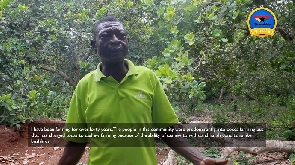Correspondence from Bono Region
For several years, farmers in the Jaman South Municipality of the Bono Region were into the cultivation of major staple food crops such as cassava, plantain, maize, yam, rice, and vegetables such as tomatoes and pepper.
Cocoa and oil palm were also the predominant cash crops that were cultivated on a large scale by the local farmers but the narrative has now shifted towards cashew cultivation which has become the predominant cash crop cultivated by most farmers in the area.
This strategic transition from cocoa, a remarkable plant with aromatic pods, prized beans, delightful flavours and Ghana’s main cash crop that has stood the test of time to cashew, a relatively new crop of uncertainty at the time in their tireless pursuit of agricultural success has become a courageous agricultural gamble.
Despite the initial scepticism, the perseverance of the farmers paid off as the cash crops thrived, offering hope and stability in the face of climate change and cashew farming has become the mainstay of most farmers in the area.
The transition which was driven by the need to combat the unpredictable and harsh climatic conditions that have posed significant threats to some traditional crops like cocoa has seen the municipality becoming one of the hubs for cashew plantation in the Bono Region with communities such as; Miremano, Abrikasu, Zezera, Anunkunano, Yaamansa, Baatia and Sebrene all boasting of several acres of blossoming cashew plants ready to produce the coveted cashew nuts.
Per the personal accounts of some farmers in the municipality, they found respite in cashew farming due to the incidents of bushfires that were rampant in the area years ago and rising temperatures.
Mr Asi Kwabena, an 80-year-old farmer at Yaaman narrated that the drift to cashew plantation was as a result of climate change in the area.
He cited bush burning and the rise in temperatures following the cutting down of trees in the forest by timber companies which the cocoa plants could not withstand.
“We were into cocoa farming but we realized bushfires and the change in temperature due to the activities of timber companies were not helping us so when we saw that the cashew is more resistant in these harsh conditions, we all moved to cashew farming”.
Agyei Stephen, who has a 150-acre cashew farm at Miremano and the 2022 Municipal Best Farmer attributes the diversion in the pattern of farming to climatic change because they realized the cashew plants were more resistant compared to cocoa.
“In the past, many people were into the planting of cocoa but that is not the case today because now every farmer has gone into cashew farming and me like this, I have 150 acres of cashew. This is because of the rate of bushfires in this area which were destroying the cocoa plants but the cashew can withstand fire and the harsh weather condition so we have all ventured into cashew farming.
Cashew is gold
Farmers who have ventured into cashew farming accentuate that cashew is like gold to them in the municipality because it has raised their standard of living which is evident in the number of houses and other properties acquired by cashew farmers.
“We the farmers in this area see cashew as gold so every individual who is able has a cashew farm because we know at the end of the year we will get something to look after our families and looking around all the buildings you see are from cashew”, Isaac Boadi boasted.
Dark clouds loom
While cashew cultivation has provided farmers with a viable and climate-resilient alternative and impacted their lives, livelihoods, and many local communities, it is crucial to acknowledge the potential risks and unintended consequences that accompany this transition.
According to Mr Joseph Waja Kumache, the Municipal Director of the Ministry of Food and Agriculture (MOFA), the transition is widespread in the municipality due to climate change and farmers have now focused solely on a single cash crop, neglecting crop diversification which has led to a decline in the production of other essential crops.
“Many farmers are into cashew farming now and I attribute that to climate change because at a point bushfire became rampant in this area so when cashew, a more resilient crop came, they diverted and now all the lands have been used for cashew plantations which come with its repercussions for food security, local food systems and price volatility”.
Mr Asi Kwabena confirmed the same fears by lamenting that the price of foodstuffs such as cassava and plantain has skyrocketed even in the villages because there are no lands for the cultivation of such crops.
“We are already feeling the impact because now the prices of cassava in this village have gone up all because of cashew so I fear that in the coming years, it will be worse”.
Way forward
Before the situation gets to an alarming level, the Jaman South Municipal Directorate of the Ministry of Food and Agriculture (MOFA) has already identified the need to approach the transition to cashew plantation with a comprehensive and multi-faceted approach that focuses on sustainability to mitigate the associated dangers so the directorate through a series of engagements has urged cashew farmers to cultivate multiple crops, including food crops and trees to enhance biodiversity, improve soil health, increase food production and provide alternative income sources in the event of price volatility.
This report is produced in fulfilment of the UNESCO & CIJ London Climate Change in News Media project facilitated by the Centre for Journalism Innovation and Development.
Watch the video below:
You can also watch some climate change interviews done by GhanaWeb below:
Author: Frank Aboagye Addo
Regional News of Monday, 5 June 2023
Source: www.ghanaweb.com

















